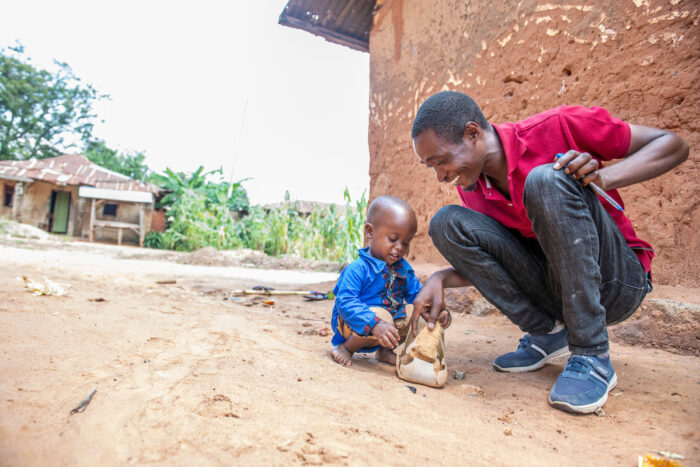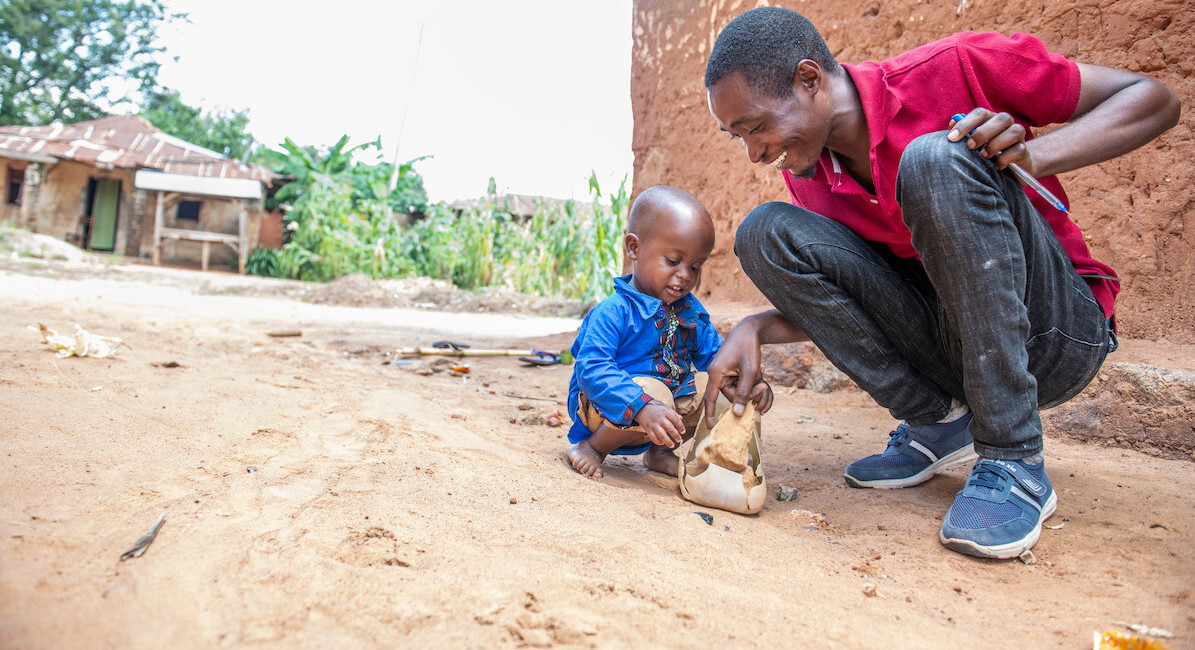Mwamini lives in Tabora, Tanzania, a short walk away from a local health clinic with her two children, Kuluthum, age 8, and Adam, who is almost 2 years old. Through the clinic, Mwamini accesses her standard health care, but she is also served by an integrated early childhood development program called the Malezi Project. Funded by the Conrad N. Hilton Foundation and supported by the Elizabeth Glaser Pediatric AIDS Foundation (EGPAF), Malezi builds on existing health infrastructure to integrate trainings and support for staff, community health workers, and parents on early childhood development. Community health workers reach out to every family with a pregnancy or infant up until three years of age in the area, including Mwamini.

Mwamini first interacted with the Malezi project when she became pregnant with Adam, her youngest child.
“I was attending the clinic and would benefit from this education,” says Mwamini. “At first when I was pregnant, we were trained on how to play and talk with the baby when still in the womb. You are comforted by the baby in the womb until you reach the stage when you are about to give birth.”
Mwamini gave birth to a beautiful baby boy, Adam, but he struggled deeply in his first months of life.
At first when I was pregnant, we were trained on how to play and talk with the baby when still in the womb. Mwamini
“When my child was born, he lived in a difficult environment,” she explains. “His health wasn’t very good. He stopped breastfeeding when he was 6 months.”
During follow-up visits, health workers noticed that it was not only Adam’s health that was a cause for concern, but also Mwamini’s health. Both Mwamini and her children were living with HIV, and their compromised immune systems were losing the battle against opportunistic infections.
Fortunately, Malezi-supported health workers know that successful early childhood development relies on a healthy environment. In the case of Mwamini, they needed to get both her and her children on quality antiretroviral therapy (ART), and they also needed to give Mwamini hope.
 Without accurate HIV education, many people fear that their HIV diagnosis is a death sentence. To a young mother, this can be especially terrifying—what will the children do if the caregiver’s body cannot go on? The truth, however, is that so long as a person adheres to quality treatment, people living with HIV can live normal lives, with safe relationships, healthy children, and an average life expectancy.
Without accurate HIV education, many people fear that their HIV diagnosis is a death sentence. To a young mother, this can be especially terrifying—what will the children do if the caregiver’s body cannot go on? The truth, however, is that so long as a person adheres to quality treatment, people living with HIV can live normal lives, with safe relationships, healthy children, and an average life expectancy.
Malezi-supported health workers were able to refer both Mwamini and her son to comprehensive HIV care, and their support did not stop at a prescribing medication.
“They managed to comfort me, they were able to give me regular counselling on child development, which helped him cheer up,” Mwamini says. “I am satisfied because through this project I have gained many more years to live with my children.”
Community health workers are key to this intervention.
“When they conduct home visits, they are not only following up on the early stimulation component, but they look at the household and ensure that all the needs of that specific household are being addressed,” explains Josephine Ferla, senior program manager for Early Childhood Development at EGPAF. “If there is a situation where the household has an HIV case then they will have to follow up on ensuring that the caregiver is adhering but also the child, if they have HIV, is adhering [to ART].”
To a young mother, an HIV diagnosis can be especially terrifying—the truth, however, is that people living with HIV can live normal lives, with safe relationships, healthy children, and an average life expectancy.
The health intervention to get Mwamini and her son on ART saved their lives, and the community health workers continue to visit them regularly. During their visits, they ensure that everyone is adhering to their medication, but they also to check in on Adam’s development.
“My brother [referring to a young male health worker] visits me from time to time, educates me, teaches me,” Mwamini says. Each time he visits, he also takes the time to play with Adam, pushing play trucks around that they made together out of household items.
Mwamini has noticed tremendous progress in Adam’s activity and mood thanks to the counseling on childhood development from the community health workers.
“He has changed,” she says. “Now he is understanding, he talks, he plays … when you send him for something he goes. So I am also happy for this achievement because if you compare how he was before and how he is now, there are major improvements.”
Not only is Adam truly an active and happy child, but Mwamini has a renewed sense of hope and drive to care for her family.

“I am sure I will raise Kuluthum and she will grow up. Adam will also grow up, and I believe that I will get grandchildren because I’ve had such people [community health workers] in my house to comfort me and remember me. I believe that my life will be good, and it won’t end before its time.”




